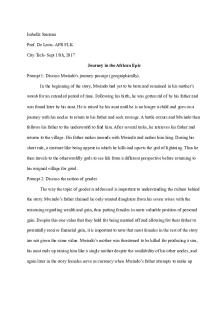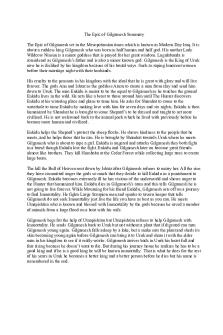Journey in the African Epic PDF

| Title | Journey in the African Epic |
|---|---|
| Course | Africana Folklore |
| Institution | New York City College of Technology |
| Pages | 3 |
| File Size | 61.6 KB |
| File Type | |
| Total Downloads | 20 |
| Total Views | 149 |
Summary
Read the folktale and give detailed answered responses to the prompt assigned...
Description
Isabella Santana Prof. De Leon- AFR FLK City Tech- Sept 18th, 2017 Journey in the African Epic Prompt 1: Discuss Mwindo's journey passage (geographically). In the beginning of the story, Mwindo had yet to be born and remained in his mother’s womb for an extended period of time. Following his birth, he was gotten rid of by his father and was found later by his aunt. He is raised by his aunt until he is no longer a child and goes on a journey with his uncles to return to his father and seek revenge. A battle occurs and Mwindo then follows his father to the underworld to find him. After several tasks, he retrieves his father and returns to the village. His father makes amends with Mwindo and makes him king. During his short rule, a creature like being appear in which he kills and upsets the god of lightning. Thus he then travels to the otherworldly gods to see life from a different perspective before returning to his original village for good. Prompt 2: Discuss the notion of gender. The way the topic of gender is addressed is important to understanding the culture behind the story. Mwindo’s father claimed he only wanted daughters from his seven wives with the reasoning regarding wealth and gain, thus putting females in more valuable position of personal gain. Despite this one value that they hold for being married off and allowing for their father to potentially receive financial gain, it is important to note that most females in the rest of the story are not given the same value. Mwindo’s mother was threatened to be killed for producing a son, his aunt ends up raising him like a single mother despite the availability of his other uncles, and again later in the story females serve as currency when Mwindo’s father attempts to make up
with him by making him king and giving him several wives. Prompt 3:Discuss the notion of gender bias. Gender bias is strongly present in this story. Although some godly individuals are both female and powerful (goddess of lightning), the story primarily focuses on the male’s role as the hero of the epic. Most of the characters are male: excluding the numerous wives mentioned, few female gods, and Mwindo’s aunt and mother. It is clear that She Mwindo prefers daughters because he does not value them as people, but more as an opportunity for gain. Thus this dehumanization is consistently present in the story. Regardless of what Mwindo does, he is made to be unstoppable and cannot die under any circumstances (that were presented). But in the beginning of the novel, She Mwindo threatens his wives that if they do not produce sons, not only will the child be killed, but them as well. This shows a focus of mortality for women versus the immortality given to the protagonist and his father who travel between the world of the living and beyond. Prompt 4:Discuss the notion of transformation. The notion of transformation in this story is recurring. Daniel P. Kunene’s analysis of Mwindo’s epic outlines the protagonist’s growth as the story continues. Although he is born cocky and capable of much more than the average infant, he holds back from his full potential at first and allows himself to be nearly killed. In the time that he is with his aunt, he grows both physically and emotionally where he matures more so into his final form. Away from the innocence of infancy, he travels with is uncles and is introduced to the feelings of rage (at their deaths) and the concept of both losing someone and killing. This shows character development (although not in a positive sense) because he experiences both loss and an exposure to overwhelming emotions that cannot always be controlled. He is also made aware of the mortality
of those around him, despite his own seemingly immortal life. You see a shift in his character when he finally catches up to his father again, as he learns the importance of emotions like forgiveness. At this point, he has nearly mature into an adult psychologically because he is coming to terms with the past and reflecting on his adventure to attempt to create a better future (and outcome). After his final incident of murder, he evolves into his final form in learning to better understand the world around him in the year he spent by the sides of the gods that oversee the world. He returns to his tribe fully matures, knowledgeable, and having come to understand the importance of life, death, and kinship....
Similar Free PDFs

Journey in the African Epic
- 3 Pages

Summary The Hero\'s Journey
- 5 Pages

The Epic of Gilgamesh - homework
- 1 Pages

Journey of the Magi Litcharts
- 14 Pages

The Epic of Gilgamesh Summary
- 1 Pages

Journey to the Seed Quotes
- 3 Pages

The Pan African Paper Mills
- 1 Pages

Heros Journey
- 5 Pages

The Epic of Gilgamesh – Prompt 1
- 3 Pages

Nike\'s journey,
- 12 Pages

African History
- 5 Pages
Popular Institutions
- Tinajero National High School - Annex
- Politeknik Caltex Riau
- Yokohama City University
- SGT University
- University of Al-Qadisiyah
- Divine Word College of Vigan
- Techniek College Rotterdam
- Universidade de Santiago
- Universiti Teknologi MARA Cawangan Johor Kampus Pasir Gudang
- Poltekkes Kemenkes Yogyakarta
- Baguio City National High School
- Colegio san marcos
- preparatoria uno
- Centro de Bachillerato Tecnológico Industrial y de Servicios No. 107
- Dalian Maritime University
- Quang Trung Secondary School
- Colegio Tecnológico en Informática
- Corporación Regional de Educación Superior
- Grupo CEDVA
- Dar Al Uloom University
- Centro de Estudios Preuniversitarios de la Universidad Nacional de Ingeniería
- 上智大学
- Aakash International School, Nuna Majara
- San Felipe Neri Catholic School
- Kang Chiao International School - New Taipei City
- Misamis Occidental National High School
- Institución Educativa Escuela Normal Juan Ladrilleros
- Kolehiyo ng Pantukan
- Batanes State College
- Instituto Continental
- Sekolah Menengah Kejuruan Kesehatan Kaltara (Tarakan)
- Colegio de La Inmaculada Concepcion - Cebu




